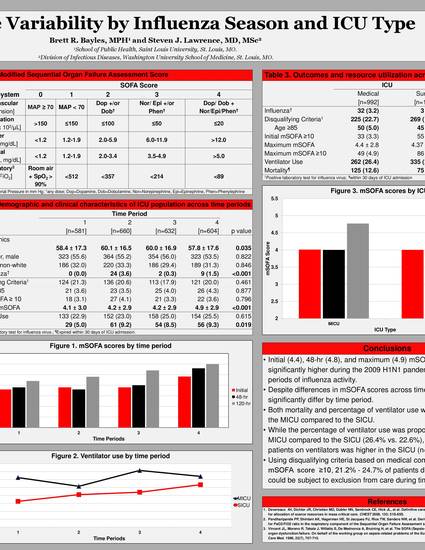
Presentation
SOFA score variability by influenza season and ICU type.
Infectious Disease Society of America Annual Meeting
(2011)
Abstract
Background: Severe respiratory events, such as pandemic influenza, have the potential to exert significant demands on hospital resources. The Sequential Organ Failure Assessment (SOFA) score has been suggested as a triage tool for the allocation of scarce critical care resources; however, little is known about the impact such triage would have on existing patients in different intensive care units (ICU) during times of variable influenza activity.
Methods: A retrospective cohort study was conducted on all adult patients admitted to medical (MICU) and surgical (SICU) ICUs at a large tertiary care medical center in St. Louis, Missouri during four separate 30-day periods: (1) no influenza activity [May-June 2008], peaks of influenza activity during (2) a severe seasonal epidemic [January-February 2008], (3) a mild seasonal epidemic [February-March 2009], and 4) H1N1 pandemic [October 2009]. Clinical data, including modified SOFA (mSOFA) scores, were compared between ICU groups and across periods using Chi-Square, Fisher’s, and Mann-Whitney U tests where appropriate.
Results: 2,728 patients were included, of which 36 (1.3%) had laboratory-confirmed influenza. Influenza incidence was highest in the MICU during period 2 (5.2%; p<.001 between ICUs and between periods). There were no differences in ventilator use by ICU type (24.8% vs. 23.3%) or between periods (22.3% – 25.9%). Median initial and 7-day maximum mSOFA scores were lower in the MICU (3 and 3 respectively) compared to the SICU (4 and 5 respectively; p<.001) across all time periods. The proportion of patients with a mSOFA score ≥11 was lower in the MICU compared to the SICU (2.2% vs. 3.8% respectively; p=.01). Median daily mSOFA (3.5) and maximum mSOFA ≥11 (3.4%) were highest in period 4 across both ICUs (p<.001).
Conclusion: Even during periods of recent peak activity, influenza has had a modest impact on ICU resource utilization. Higher mSOFA scores were associated with the SICU and with peak pandemic (H1N1) 2009 influenza activity. If SOFA score-based triage protocols are implemented during a future severe pandemic, pre-existing SICU patients may be disproportionately affected. In that setting, cancellation of elective surgeries to reduce SICU populations may be a critical mitigation strategy.
Keywords
- Hospital-acquired and surgical infections,
- infection control,
- health outcomes
Disciplines
Publication Date
2011
Location
Boston, MA
Comments
Poster Presentation
Citation Information
Brett R. Bayles and Steven J Lawrence. "SOFA score variability by influenza season and ICU type." Infectious Disease Society of America Annual Meeting (2011) Available at: http://works.bepress.com/brett-bayles/9/
